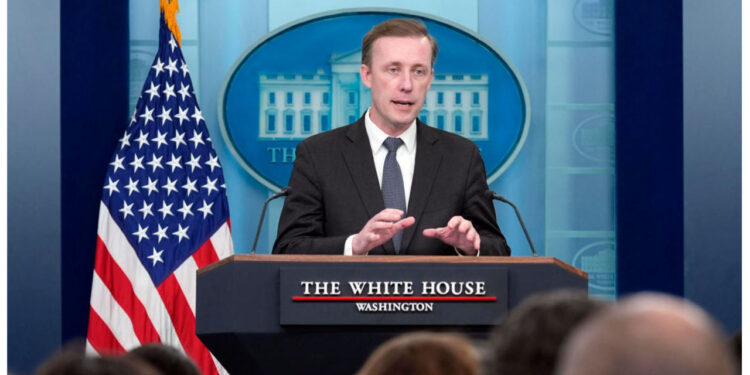The United States and Saudi Arabia are “days away” from signing a historic bilateral agreement that has long been a top priority for President Joe Biden because it would pave the way for normalizing relations between the Kingdom and Israel, a source familiar with the matter told us on Sunday.
National Security Advisor Jake Sullivan and Crown Prince Mohammad bin Salman met in Dhahran, Saudi Arabia, a city in the kingdom’s far east that is home to its state-run oil giant, the Saudi Arabian Oil Co., also known as Saudi Aramco, on Saturday, and a US official confirmed that they made significant progress.
The Saudi Ministry of Foreign Affairs praised the draft deal as “nearly final” in a statement late Saturday.
The first component of the deal consists of a series of agreements between the United States and Saudi Arabia, which include defense assurances and civil nuclear cooperation. The Biden administration would strengthen its ties with Saudi Arabia at a time when rival China seeks to grow its influence in the Middle East.
A second component would improve relations between Saudi Arabia and Israel, but this is dependent on a third, more problematic and aspirational component that would pave the road for a Palestinian state.
Secretary of State Antony Blinken has stated that part of the vision calls for both “calm in Gaza” and a “credible pathway to a Palestinian state.” Arriving in the region on Saturday, Sullivan and other Biden officials visited Israel on Sunday, with a scheduled meeting with Israeli Prime Minister Benjamin Netanyahu to discuss the possible arrangement.
According to a source acquainted with the Kingdom’s position, Saudi Arabia has made it clear that nothing can happen without a two-state solution that includes Palestinian self-rule in the West Bank and Gaza. Putting aside the Palestinian issue is practically impossible now, given the Arab world’s broad outrage over the massive humanitarian toll on Palestinians in Gaza since Israel invaded the 25-mile area in pursuit of Hamas terrorists who killed 1,200 on October 7.
Since then, Biden has publicly stated that he believes Hamas launched that deadly attack to thwart his previous attempts to negotiate a Saudi-Israel normalization agreement that did not prioritize the Palestinians.
Given Netanyahu’s professed hostility toward a Palestinian state, it is uncertain what he will agree to, but Israel’s internal political crisis is putting pressure on him. This week, two of the three Unity cabinet members publicly questioned Netanyahu’s Gaza plan, and Minister Benny Gantz has threatened to resign by June 8 if crucial decisions remain unmade. Gantz, who has already called for elections in September, is widely considered a potential future prime minister. According to a spokeswoman, Gantz has also recently spoken with Sullivan regarding the Saudi transaction.
Officials from the Biden administration hope that the politically embattled Netanyahu will see the significant security and diplomatic win of normalizing relations with Saudi Arabia as an opportunity and a reason to compromise on Palestinian issues, despite the risk of alienating right-wing members whose support is critical to the survival of his fragile coalition government.
Some of these nationalist right-wing ministers advocate for Israeli settlement and control of the Palestinian-majority West Bank and Gaza, which they refer to as Judea and Samaria in biblical terms.
There are also domestic complications in the United States. A well-known source informed CBS News of the mounting pressure to finalize the agreement, given the remaining weeks on the Congressional calendar and the need for lawmakers to approve a security arrangement. The expectation has been that Democrats are dubious of the Kingdom’s human rights violations, and Prince Mohammad would be more inclined to approve the accord and its nuclear component if approached by a Democratic President.
Republican Sen. Lindsay Graham, a Trump friend, has also been visiting the region and advocating for this diplomatic agreement, which builds on the framework of the Trump-era Abraham Accords, which helped improve relations between Israel and many of its neighboring neighbors but not Saudi Arabia. While Trump has the potential to pursue an Israel-Saudi pact if he wins the general election in November, he may struggle to persuade Democrats to support it. Throughout his 2024 presidential campaign, Trump regularly emphasized his regional legacy.










